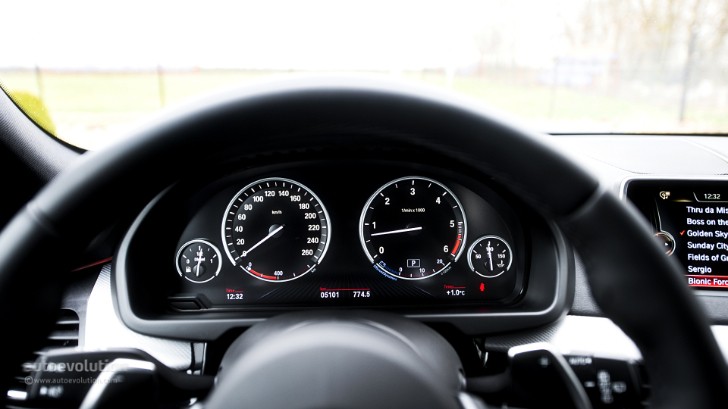When it comes to fuel efficiency estimates, most of us are frustrated when we reach the petrol station. That’s because it seems like our car’s manual says one thing and the real-world numbers say a completely different thing.
Take the BMW X5 M50d for example. We recently had the opportunity to test it and see if it’s really that frugal diesel alternative to M cars that some people claim it is. Before we even set out to drive it in a busy city we completely reset the onboard computer and all of its values, including the mpg rating.
Immediately after that we checked the official specs of the new Bimmer to see what the BC should display after 100 km (62 miles). The official numbers go like this: 7.6 l/100 km (30.9 mpg) inside the city, 6.2 l/100 km (37.9 mpg) on the highway and 6.7 l/100 km (35.1 mpg) on a combined cycle.
What I can tell you is that inside the city, we reached even as low as 10.5 l/100 km (22.4 mpg) whilst outside the city, the lowest number the BC showed was 9.2 l/100 km (25.5 mpg). Before you go all ballistic on me, calling the official stats ‘phony’ and other things, hear me out.
This is a car that uses a 3-liter, triturbo diesel engine making 381 HP and 740 Nm (545 lb-ft) of torque. It’s also really big, heavy and all-wheel-drive all the time. On top of that, it will do 0-100 km/h (62 mph) from a standstill in just 5.3 seconds.
Looking over the sheer performance of the car might also leave you simply indifferent, claiming that it still should return the claimed numbers but look at it this way: earlier this year, we tested a Toyota RAV4 fitted with a 2.2-liter diesel engine. That car returned a fuel consumption of 7.8 l/100 km (30 mpg) inside the city.
To put things better into perspective, you should take into consideration that the RAV4 uses a smaller engine with 150 HP and 340 Nm (251 lb-ft) of torque and does 100 km/h (62 mph) in nearly twice as long. At the same time, the difference is just 2.7 l/100 km (4.5 mpg). Furthermore, to actually realize just how good this car is, you just have to drive it. That engine just pulls and pulls and pulls and it doesn't want to stop.
I, for one, find the difference rather meaningless, considering the sheer performance of the M50d. Sure, it’s not what the manufacturer promises but it’s not too thirsty either. As a matter of fact, during my time with the car, no matter how hard I pushed it, it wouldn’t go over 18 l/100 km (13 mpg) and that’s peanuts compared to a petrol version. Ask any X5 M owner.
Immediately after that we checked the official specs of the new Bimmer to see what the BC should display after 100 km (62 miles). The official numbers go like this: 7.6 l/100 km (30.9 mpg) inside the city, 6.2 l/100 km (37.9 mpg) on the highway and 6.7 l/100 km (35.1 mpg) on a combined cycle.
What I can tell you is that inside the city, we reached even as low as 10.5 l/100 km (22.4 mpg) whilst outside the city, the lowest number the BC showed was 9.2 l/100 km (25.5 mpg). Before you go all ballistic on me, calling the official stats ‘phony’ and other things, hear me out.
This is a car that uses a 3-liter, triturbo diesel engine making 381 HP and 740 Nm (545 lb-ft) of torque. It’s also really big, heavy and all-wheel-drive all the time. On top of that, it will do 0-100 km/h (62 mph) from a standstill in just 5.3 seconds.
Looking over the sheer performance of the car might also leave you simply indifferent, claiming that it still should return the claimed numbers but look at it this way: earlier this year, we tested a Toyota RAV4 fitted with a 2.2-liter diesel engine. That car returned a fuel consumption of 7.8 l/100 km (30 mpg) inside the city.
To put things better into perspective, you should take into consideration that the RAV4 uses a smaller engine with 150 HP and 340 Nm (251 lb-ft) of torque and does 100 km/h (62 mph) in nearly twice as long. At the same time, the difference is just 2.7 l/100 km (4.5 mpg). Furthermore, to actually realize just how good this car is, you just have to drive it. That engine just pulls and pulls and pulls and it doesn't want to stop.
I, for one, find the difference rather meaningless, considering the sheer performance of the M50d. Sure, it’s not what the manufacturer promises but it’s not too thirsty either. As a matter of fact, during my time with the car, no matter how hard I pushed it, it wouldn’t go over 18 l/100 km (13 mpg) and that’s peanuts compared to a petrol version. Ask any X5 M owner.
